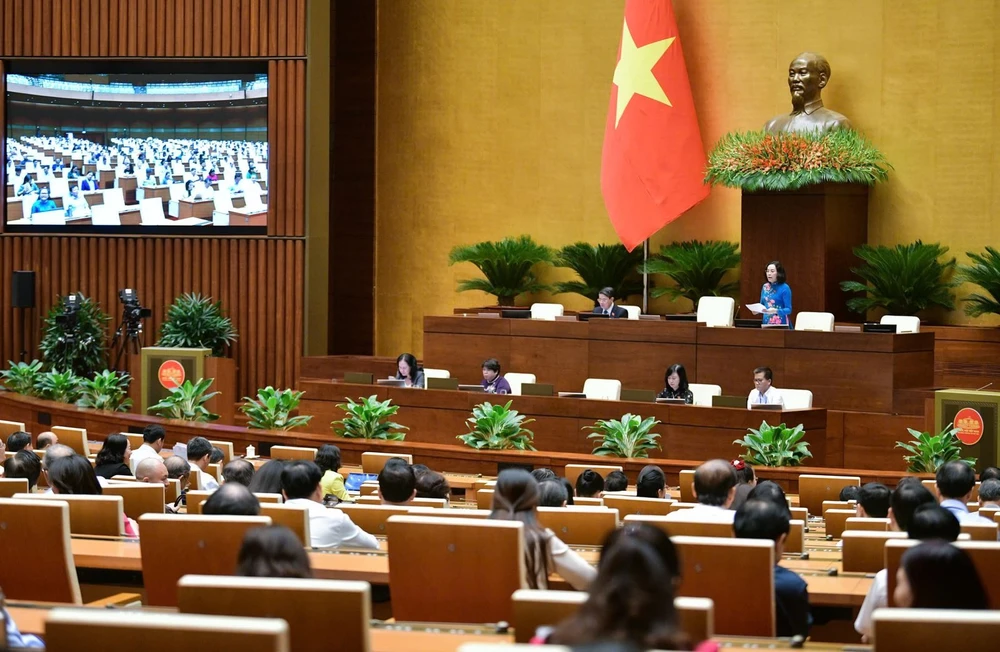Vietnam’s National Assembly Debates Revised Pharmacy Law

Hanoi, The Gulf Observer: On Tuesday, the 8th session of the 15th National Assembly of Vietnam convened to discuss the draft version of the revised Pharmacy Law, aimed at positioning the pharmaceutical industry as a vital pillar of the nation’s economy.
Nguyễn Thúy Anh, Chairwoman of the National Assembly’s Committee for Social Affairs, presented updates and feedback on the draft law during the session. Her report focused on Vietnam’s pharmaceutical policies, industry development, and key amendments, including Article 8, which promotes incentives and investment support for the sector.
Anh emphasized the role of Article 7, highlighting its focus on prioritizing domestically-produced drugs in public healthcare facilities. It also seeks to simplify administrative procedures for drug registration and import permits, and lower prices for certain pharmaceuticals to encourage technology transfer.
Key regulatory changes were incorporated in the draft, with particular attention to pharmacy chains. Article 48, which clarifies the definition of a pharmacy chain, and Article 33, regulating business licenses for chains, were discussed. Article 17, outlining the qualifications and responsibilities of pharmacists within these chains, was also a focal point.
Regarding online pharmaceutical sales, amendments were made to Articles 6 and 42, specifying the types of pharmaceuticals permitted for online sale and expanding prohibited activities on digital platforms. These amendments also raised the operational standards of online pharmacies.
Several deputies provided feedback on the draft law. Deputy Nguyễn Tâm Hùng of Bà Rịa-Vũng Tàu Province expressed support but called for clearer definitions, particularly regarding medicinal herbs. He stressed the need for safety standards in herbal pharmaceutical production and proposed tighter quality control measures to combat counterfeit drugs sold online.
Deputy Trần Thị Nhị Hà from Hanoi raised concerns about the inconsistencies in price management for prescription and non-prescription drugs. She questioned the draft’s mandate requiring provincial-level People’s Committees to collect drug price declarations and suggested narrowing the types of pharmacies required to participate in the declaration process.
Deputy Nguyễn Lâm Thành from Thái Nguyên Province voiced concerns over the minimum investment requirements outlined in Article 8, which sets a threshold of VNĐ3 trillion ($127 million) with VNĐ1 trillion to be disbursed in the first three years. Thành argued these conditions were too strict, particularly for research and development, technology transfer, and traditional medicine projects, and suggested lowering the investment thresholds.
Deputy Trần Khánh Thu from Thái Bình Province criticized Article 53a, which restricts foreign-invested enterprises (FIEs) from engaging in pharmaceutical storage. Thu argued that this restriction conflicts with Vietnam’s commitments in various free trade agreements and proposed a revision to ensure the country’s legal framework aligns with international norms.
Meanwhile, Deputy Phạm Khánh Phong Lan from HCM City raised concerns over the current bidding process for pharmaceuticals, which prioritizes the lowest price, potentially jeopardizing quality and sustainability. Lan called for revisions to ensure a steady supply of essential medicines and vaccines, alongside fostering long-term industry growth.
Minister of Health Đào Hồng Lan responded to the deputies’ concerns, particularly regarding incentives for the pharmaceutical sector. She clarified that while incentives are crucial, incorporating all of them into a single law would be challenging, as they intersect with broader economic regulations. The minister assured that these would be addressed in more specialized laws, with the revised draft providing overarching guidelines.
The minister also clarified the provisions concerning online pharmaceutical sales, stating that only e-commerce platforms with ordering functionality would be allowed to sell pharmaceuticals online, reinforcing the government’s efforts to regulate the digital marketplace.
The National Assembly is expected to continue discussions on the revised Pharmacy Law in the coming sessions.


